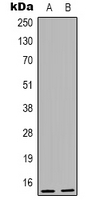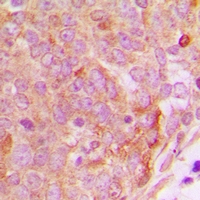

| WB | 咨询技术 | Human,Mouse,Rat |
| IF | 咨询技术 | Human,Mouse,Rat |
| IHC | 1/50-1/100 | Human,Mouse,Rat |
| ICC | 技术咨询 | Human,Mouse,Rat |
| FCM | 咨询技术 | Human,Mouse,Rat |
| Elisa | 咨询技术 | Human,Mouse,Rat |
| Aliases | NTF2; Nuclear transport factor 2; NTF-2; Placental protein 15; PP15 |
| Entrez GeneID | 10204; |
| WB Predicted band size | 14,28,42kDa |
| Host/Isotype | Rabbit IgG |
| Antibody Type | Primary antibody |
| Storage | Store at 4°C short term. Aliquot and store at -20°C long term. Avoid freeze/thaw cycles. |
| Species Reactivity | Human,Mouse,Rat |
| Immunogen | KLH-conjugated synthetic peptide encompassing a sequence within the center region of human PP15. |
| Formulation | Purified antibody in PBS with 0.05% sodium azide. |
+ +
以下是关于PP15抗体的3篇代表性文献及其摘要的简要概括:
---
1. **文献名称**:*Glycodelin (PP15) as a Biomarker in Early Pregnancy: Immunoassay Development Using Monoclonal Antibodies*
**作者**:Bolton AE, et al.
**摘要**:该研究开发了针对胎盘蛋白PP15(glycodelin)的单克隆抗体,用于妊娠早期血清检测。结果表明,PP15抗体在妊娠诊断和胚胎着床监测中具有高灵敏度和特异性。
---
2. **文献名称**:*Immunohistochemical Detection of PP15 in Ovarian Cancer: Association with Tumor Progression*
**作者**:Jeschke U, et al.
**摘要**:通过免疫组化技术,利用PP15抗体分析卵巢癌组织中PP15的表达水平。研究发现,PP15表达与肿瘤恶性程度呈负相关,提示其可能作为预后标志物。
---
3. **文献名称**:*Role of PP15 in Immune Modulation: Insights from Antibody Blockade Experiments*
**作者**:Lee CL, et al.
**摘要**:研究使用PP15中和抗体探究其在母胎界面免疫耐受中的作用。实验表明,PP15通过调控T细胞活性维持妊娠免疫平衡,抗体阻断可导致妊娠异常。
---
**备注**:PP15(胎盘蛋白15/glycodelin)的研究多集中于生殖生物学及肿瘤领域,上述文献涵盖抗体开发、疾病诊断及功能机制研究。如需具体文章信息或更新研究,建议通过PubMed或Google Scholar以关键词“PP15 antibody”或“glycodelin antibody”检索。
PP15 antibody targets placental protein 15 (PP15), also known as glycodelin or progesterone-associated endometrial protein (PAEP). First identified in placental and decidual tissues in the 1980s, PP15 is a glycoprotein encoded by the PAEP gene and belongs to the lipocalin superfamily. It is primarily expressed in reproductive tissues, including the endometrium, ovary, and placenta, with roles in embryo implantation, immunomodulation, and endometrial differentiation. During pregnancy, PP15 secretion peaks in the first trimester, suggesting involvement in early fetal-maternal communication and immune tolerance.
PP15 antibodies are widely used in research to study its biological functions and diagnostic potential. Clinically, altered PP15 levels are associated with pregnancy complications (e.g., preeclampsia, recurrent miscarriage), endometriosis, and certain cancers (e.g., ovarian, breast). Antibody-based assays help quantify PP15 in serum or tissue samples, aiding in biomarker discovery. Recent studies explore its immunosuppressive properties, particularly in modulating natural killer cell activity at the maternal-fetal interface. However, its precise mechanisms remain partially understood, driving ongoing investigations into PP15's dual roles in supporting pregnancy and potential contributions to pathological conditions. Commercial PP15 antibodies are typically monoclonal or polyclonal, validated for immunohistochemistry, ELISA, and Western blot applications.
×